Rather changeable this life of mine, was it not? Before I was twenty-five years of age, I had tried doctoring, caricaturing portrait-painting, old picture-making, and Institution-managing; and now, with the help of Alicia, I was about to try how a little marrying would suit me. Surely, Shakespeare must have had me prophetically in his eye, when he wrote about “one man in his time playing many parts.” What a character I should have made for him, if he had only been alive now!
I found out from the coachman, among other matters, that there was a famous fishing stream near Barkingham; and the first thing I did, on arriving at the town, was to buy a rod and line.
It struck me that my safest way of introducing myself would be to tell Doctor Dulcifer that I had come to the neighborhood for a little fishing, and so to prevent him from fancying that I was suspiciously prompt in availing myself of his offered hospitality. I put up, of course, at the inn—stuck a large parchment book of flies half in and half out of the pocket of my shooting-jacket—and set off at once to the doctor’s. The waiter of whom I asked my way stared distrustfully while he directed me. The people at the inn had evidently heard of my new friend, and were not favorably disposed toward the cause of scientific investigation.
The house stood about a mile out of the town, in a dip of ground near the famous fishing-stream. It was a lonely, old-fashioned red-brick building, surrounded by high walls, with a garden and plantation behind it.
As I rang at the gate-bell, I looked up at the house. Sure enough all the top windows in front were closed with shutters and barred. I was let in by a man in livery; who, however, in manners and appearance, looked much more like a workman in disguise than a footman. He had a very suspicious eye, and he fixed it on me unpleasantly when I handed him my card.
I was shown into a morning-room exactly like other morning-rooms in country houses.
After a long delay the doctor came in, with scientific butchers’ sleeves on his arms, and an apron tied round his portly waist. He apologized for coming down in his working dress, and said everything that was civil and proper about the pleasure of unexpectedly seeing me again so soon. There was something rather preoccupied, I thought, in those brightly resolute eyes of his; but I naturally attributed it to the engrossing influence of his scientific inquiries. He was evidently not at all taken in by my story about coming to Barkingham to fish; but he saw, as well as I did, that it would do to keep up appearances, and contrived to look highly interested immediately in my parchment-book. I asked after his daughter. He said she was in the garden, and proposed that we should go and find her. We did find her, with a pair of scissors in her hand, outblooming the flowers that she was trimming. She looked really glad to see me—her brown eyes beamed clear and kindly—she gave my hand another inestimable shake—the summer breezes waved her black curls gently upward from her waist—she had on a straw hat and a brown Holland gardening dress. I eyed it with all the practical interest of a linendraper. O Brown Holland you are but a coarse and cheap fabric, yet how soft and priceless you look when clothing the figure of Alicia!




